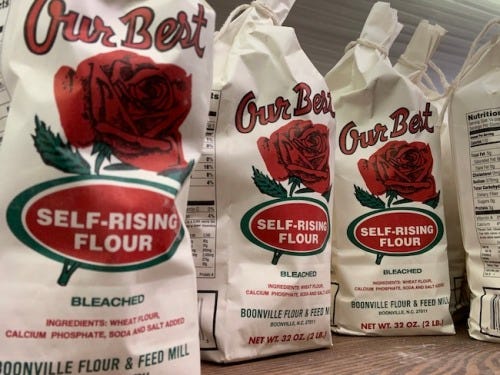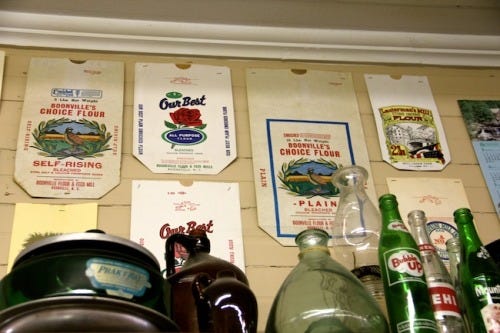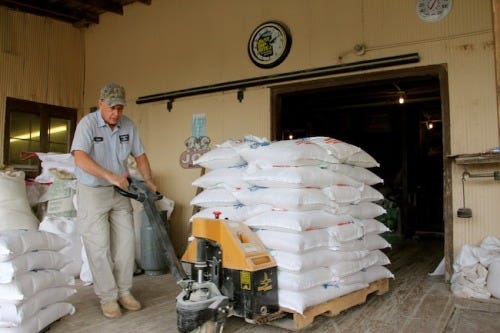It has been snowing across North Carolina from mountains to coast. It seems only fitting, then, that breakfast should involve a silky, white, homegrown flour that matches the fine grain of the falling snow. Donna has made her signature biscuits, about as big around as the bottom of a juice glass, which we promptly split open, top with thin rags of country ham and douse with red eye gravy. They are thin and crispy, bottom and top, but they hold the gravy and stay steady on the fork.
Donna’s crispy biscuits
As we eat, I count 15 species of birds outside—from downy woodpeckers to greedy bluebirds to brown-headed nuthatches to yellow-green pine warblers. They perch and parry with one another in the drifts of snow before devouring the seed and suet I have put out for them. For my last biscuit, I leave off the ham and gravy and dress it with a compote of figs and rhubarb, preserved with the juice of a squeezed lemon.
This is the second time we’ve had biscuits prepared from a classic, old-fashioned flour that is preservative free and made from soft red wheat grown mostly in Yadkin County. Boonville Flour and Feed Mill is about 45 minutes northwest of Winston Salem on Highway 67. If you are on a Yadkin winery tour, Boonville is a convenient stop. This rolling part of the state is steeped in Native American history, too. The crossroads at Highways 601 and 67 bring together the original trading routes of the Catawba tribe.
A week ago, when Donna Campbell and I walked into the retail store that fronts the mill operation, Cindy Howell, who minds the store, was taking a phone order from southern California. That got my attention. Word is clearly out on this special southern kitchen staple.
Boonville Flour and Feed Mill also produces all purpose flour, corn meal, and grits
We first heard about Boonville Flour more than a year ago from Sharon Benton, the wife of Allan Benton, whose deeply flavorful Tennessee smoked bacon and hams are favored by top chefs across the South. Sharon said Boonville Flour mixed with Cruze Buttermilk (only available in Knoxville) always makes the best biscuits. Though we tasted the thick and delicious Cruze Buttermilk back in the fall when weekend guests brought some along from Knoxville, it took us a while to get to Boonville for the flour.
Used to be, many towns had their own local mills that provided corn meal, grits, and flour to local customers. Not so much anymore. Even among the giants of southern milling, things have changed. One of the regional standard bearers, White Lily, also of Knoxville, Tennessee, was bought out by Smuckers in 2006, and the company closed the Tennessee plant two years later. Southern Biscuit flour, still on the market, originated in North Carolina in 1935 at Maiden Mills in Newton, near Hickory. This large milling operation is now owned by a company called Renwood and can mill 750,000 pounds of flour per day. They sell their mass-produced product to grocery chains across the region.
Bags from by-gone mills
Other smaller operations such as Dellinger Mill, established in 1867 in Mitchell County near Bakersville, mainly exist to demonstrate old fashioned stone milling techniques to visitors. Dellinger’s water-powered mill is the last of its kind in operation, the owners say, and a bag of cornmeal or grits from there is $10.00.
The Old Guilford Mill, near the Piedmont Triad Airport, was first established in 1767. The water-powered mill has been managed by a succession of owners. Today’s product line includes a range of muffin, pancake, and biscuit mixes that sell for under $7 a bag.
Lindley Mills of Graham, NC, established in 1755, is now best known for its trendy organic whole grain wheat, rye, spelt, and kosher flours which sell in the $7 range per two-pound bag.
So, there’s really nothing quite like Boonville Flour that I can find in North Carolina. Sammie Phillips, now 94, bought the 19thcentury mill in 1979, and son Eugene and daughter-in-law Vicki Phillips now run the operation. The storefront at 203 Carolina Avenue South dates back to 1896 and is decorated with an array of local feed and flour bags that recall the earlier profusion of smaller mills like this one. The store also carries a variety of old-fashioned stick candies, 100% scuppernong juice from the local area, and some very fine local country ham.
Eugene Phillips runs the Boonville Mill
Workers in the Boonville mill might grind and bag around 1,000 pounds a day. They don’t sell to grocery chains, but they do sell to a number of restaurants and small markets in the vicinity. Cindy Howell has been at the register for more than eight years and says she now takes orders from all 50 states. She recommends keeping the flour in the fridge or freezer since it comes pure, without preservatives. “Once people try it, they come back for more,” she said.
We did—for holiday presents this season and for biscuits in the Campbell family’s traditional Christmas morning breakfast. Unless there is a bad year among local wheat growers, Howell tells us, you can be sure the Boonville products come from wheat and corn grown in the area, only occasionally supplemented by Ohio wheat. Self-rising and all-purpose baking flour, corn meal, and grits are the mill’s main products. They also carry livestock feeds.
And by the way, the Boonville prices are old-fashioned, too: a two-pound bag of the self-rising flour is $2.00. The grits are $3.00, and the self-rising corn meal is $4.00 a bag. They are open for business Monday through Friday 8 am to 4 pm.









